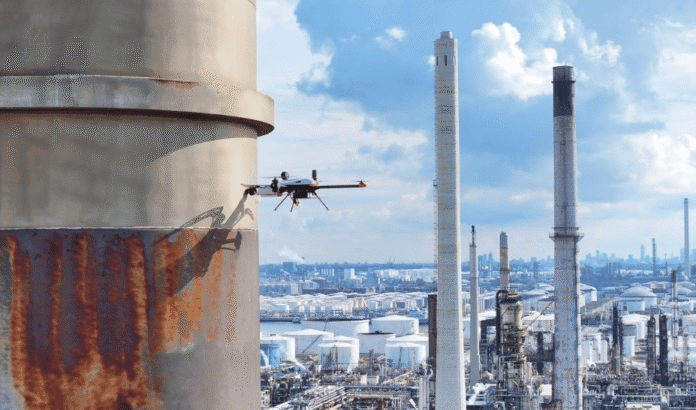Voliro, a Swiss innovator in aerial robotics, today announced an extension of its Series A round, bringing the total raised to €19.8 million to accelerate development and deployment of their autonomous aerial inspection robots.
Voliroʼs Series A extension saw new participation from noa and the addition of a debt facility from UBS. The original round was led by Cherry Ventures.
“Voliroʼs technology directly addresses a trifecta of global needs: improving industrial resilience and safety, enabling the climate adaptation and energy transition by better maintaining assets like wind farms, and alleviating severe workforce shortages in the inspection field. Our technology represents a necessary tool to protect the built environment that we all rely on,ˮ said Florian Gutzwiller, Voliroʼs CEO.
Founded in 2019 and a spin-off of ETH Zurichʼs Autonomous Systems Lab, Voliro develops advanced aerial robots that perform precision inspection and maintenance tasks at height. The companyʼs flagship Voliro T drone features a patented 360° tiltable rotor system, allowing it to make stable contact with structures for non-destructive testing (NDT) and other high-value inspection interventions.
Voliroʼs open-platform design supports a range of sensor and tool payloads, enabling one robot to tackle multiple industrial inspection needs.
The mission of Voliro is to increase safety, data quality, and efficiency for work at height, ensuring that critical infrastructure can be monitored and maintained without putting humans in harmʼs way.
Built on a patented tiltable-rotor design and equipped with interchangeable sensor payloads, the Voliro T platform looks to present a new standard in intelligent, contact-based inspection.
Since its founding, Voliro has established a strong global footprint with 100+ contact inspections monthly and 40+ customers in 17 countries, including Chevron, Holcim, and Acuren.
“Large scale Industrial inspections are a massive opportunity for robotics and automation disruption. Both aging and new assets, whether industrial, energy or infrastructure related, will benefit from more frequent, automated, reliable, and data-driven inspections,ˮ said Gregory Dewerpe, Founder and Managing Partner at noa. ˮWeʼre delighted to partner with Voliro, a breakthrough platform with the potential to transform how critical infrastructure is maintained and safeguarded in the decades to come, and our first investment in my home country of Switzerland.ˮ
As industrial assets age, Voliro argues that failures in critical, hard-to-access structures like flare stacks, storage tanks, chimneys, and towers are becoming more frequent, risky, and costly. Investigations into major accidents over the past decade repeatedly cite corrosion, wall thinning, or undetected fatigue as root causes – issues that are frequently overlooked because traditional inspections are costly, infrequent, and largely reactive.
Studies show that up to 30% of major industrial accidents in Europe involve aging infrastructure and integrity issues. Globally, corrosion-related failures are estimated to cost the economy €2.1 trillion annually. Traditional inspection methods rely on scaffolding, rope access, and shutdowns – approaches that Voliro says introduce significant risk, delay critical diagnostics, and limit how often inspections can be performed.
At the same time, in the U.S., nearly two-thirds of certified NDT (non-destructive testing) professionals are over 40, reflecting a broader trend seen across OECD countries, where a wave of retirements is accelerating due to aging populations. As experienced inspectors exit the workforce, industries face a need for smarter technology and tools that reduce reliance on manual access while attracting a new generation of digital-native technicians.
Voliro aims to address this dual challenge with their class of aerial robots designed to inspect hard-to-reach infrastructure safely and efficiently. From flare stacks and storage tanks to wind turbine blades and transmission towers, the Voliro T platform empowers asset owners across the energy, chemicals, and renewables sectors to detect issues early with proactive maintenance and reduce downtime.
In the fast-growing wind industry, where uptime is crucial, Voliro reportedly enables 5x faster wind turbine lightning protection system (LPS) inspections with insights – cutting downtime and reducing inspection costs by up to 50%, all without manual access.
Gutzwiller adds: “Infrastructure is the backbone of modern civilisation – and maintaining it is one of the great challenges of our time. With the support of noa Ventures and a growing network of forward-looking customers, weʼre delivering on a vision that once felt like science fiction: autonomous aerial robots at the forefront of industrial intelligence. By combining cutting-edge robotics with real-world safety, sustainability, and workforce needs, weʼre contributing to a smarter future for the modern world.ˮ
The new investment will accelerate the development of the next-generation Voliro T platform – including deeper cloud integration with the support of AI-powered inspection reporting diagnostics, enhanced autonomy, and modular payloads. These advancements mark a shift from semi-automated inspection toward full autonomy – and from passive sensing to active intervention – pushing the boundaries of what aerial robots can do in industrial environments.






